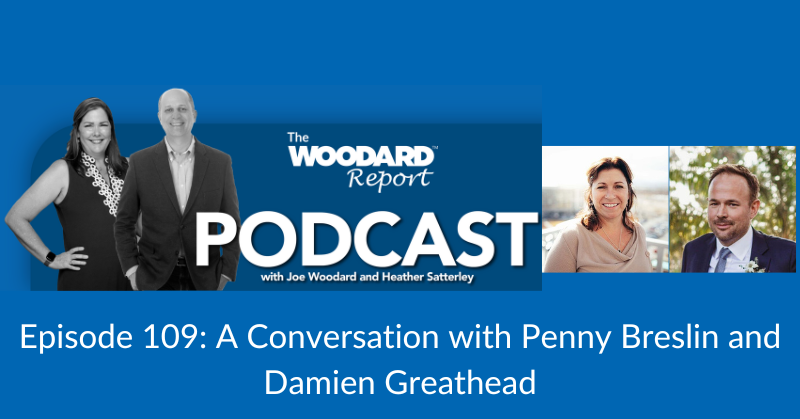In the latest episode of The Woodard Report Podcast, hosts Joe Woodard and Heather Satterley engage in a dynamic conversation with Penny Breslin and Damien Greathead.
The discussion revolves around their newly developed system for Client Advisory Services (CAS) practices, detailed in their book, It's Not Just the Numbers: How to Move Beyond the Numbers and Deliver Real Value for Your Clients.
The book provides a structured model for firms looking to streamline their client advisory services (CAS) practices while enhancing efficiency and scalability.
Introducing Penny Breslin and Damien Greathead
Penny Breslin serves as the COO of MoneyPenny, an outsourcing firm that supports CAS practices. Her expertise in CAS extends beyond staffing solutions; she fundamentally understands how firms can optimize back-office support to improve client service delivery.
Damien Greathead has worked across multiple facets of the accounting profession. With experience in coaching and software solutions, he now serves as Head of Marketing at Intuit in Australia.
Alongside Liz Farr, who contributed editorial expertise, Greathead and Breslin have created a framework designed to help CAS practices refine their processes and adopt scalable, technology-driven solutions.
The BOSS Model: Redefining CAS
At the heart of their discussion is the BOSS model—Back Office Support System. This model aims to streamline CAS practices by focusing on systematic processes and leveraging technology.
Breslin and Greathead emphasize the importance of structured workflows, clearly defined roles, and effective communication in scaling a successful CAS practice.
Breaking down the 11-step BOSS model
The BOSS model is built on 11 essential steps, each designed to optimize different aspects of a CAS practice.
1. Define your purpose
Before diving into CAS services, practitioners must clarify what they aim to achieve. Defining a firm's mission helps in setting clear goals, identifying target clients, and ensuring that all business strategies align with this purpose.
2. Build a strong team
Breslin emphasizes that assembling the right team is essential. Firms must ensure that employees are engaged and aligned with the firm’s objectives. A key takeaway is involving employees in decision-making processes, especially when implementing new tools and workflows.
3. Select the right clients
Not every client is a good fit for CAS. The speakers highlight the importance of choosing clients based on commonalities such as industry, size and business needs. A focused client base allows for more standardized processes and a more efficient service delivery model.
4. Optimize technology
Technology plays a crucial role in modern CAS practices. The hosts discuss the necessity of selecting a robust technology stack, distinguishing between essential tools (such as general ledger software) and supplementary applications tailored to specific industries.
5. Establish standardized procedures
Breslin stresses that firms often struggle due to inconsistent processes. Standardizing workflows ensures consistency, reduces inefficiencies, and facilitates easier delegation of tasks within the team.
6. Implement strategic pricing
Pricing must be structured based on data rather than assumptions. Greathead advises firms to adopt cost-accounting principles, determining pricing by analyzing service delivery costs and transaction volumes. Firms should also implement mechanisms to track scope changes and adjust fees accordingly.
7. Conduct effective client meetings
Client meetings should be used to reinforce service expectations and clarify roles. A structured service level agreement (SLA) can prevent misunderstandings by explicitly stating the responsibilities of both the firm and the client.
8. Engage the bookkeeping manager
Once a new client is onboarded, a bookkeeping manager (BKM) oversees the implementation of agreed-upon processes. This role ensures consistency in service delivery and helps uncover any previously overlooked issues in the client’s financial records.
9. Maintain open communication
Ongoing communication is vital for success. Whether through Slack channels, workflow solutions, or regular check-ins, firms must ensure that team members and clients stay informed about project statuses and responsibilities.
10. Prioritize security
Data security is a non-negotiable aspect of any CAS practice. The BOSS model incorporates secure document handling and communication protocols to protect sensitive financial information.
11. Develop a client operational manual
A client operational manual serves as a reference guide for both clients and internal teams. This document ensures clarity regarding processes, responsibilities, and security protocols, fostering trust and efficiency.
Listen to the full conversation
To hear more about Breslin's and Greathead's take on the BOSS model, listen to the full podcast below or take a peek at Breslin's and Greathead's professional profiles.
Follow The Woodard Report Podcast on your favorite podcast platform.
Sponsored by Zoho
This episode is sponsored by Zoho, a unique and powerful software suite to transform the way you work, designed for businesses of all sizes, built by a company that values your privacy. Learn more at Woodard.com/podcast.
.png?width=150&height=63&name=TWRlogo-regmark_blueblack%20(1).png)
.png)










Do you have questions about this article? Email us and let us know > info@woodard.com
Comments: